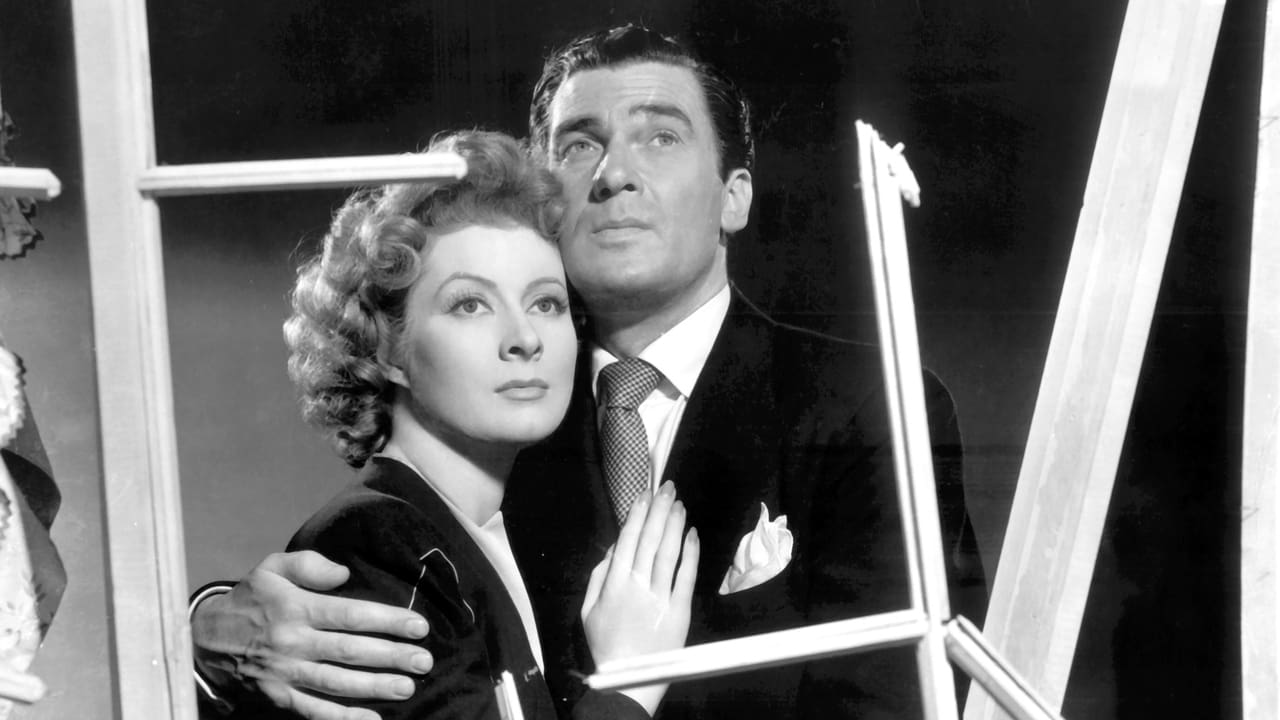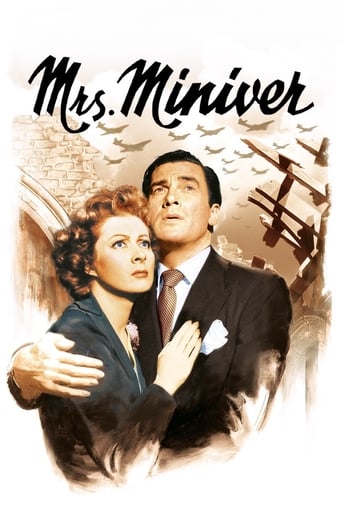



Save your money for something good and enjoyable
I have absolutely never seen anything like this movie before. You have to see this movie.
View Moreif their story seems completely bonkers, almost like a feverish work of fiction, you ain't heard nothing yet.
View MoreExcellent and certainly provocative... If nothing else, the film is a real conversation starter.
View MoreCopyright 15 May 1942 by Loew's Inc. Presented by Metro-Goldwyn-Mayer. New York opening at Radio City Music Hall: 4 June 1942. U.S. release: 13 May 1942. Australian release: 1 October 1942. Sydney release at the Liberty. 12,013 feet. 14 reels. 133½ minutes.SYNOPSIS: Well-to-do English family copes with the outbreak of war - son enlists in the air force, father helps evacuate Dunkirk, mother captures a German aviator.NOTES: Mrs Miniver was voted Best Film of 1942 in The Film Daily annual poll of newspaper critics. Bosley Crowther placed the film on his Ten Best. The National Board of Review voted it third (after In Which We Serve and One of Our Aircraft is Missing). Picturegoer placed it first.COMMENT: It would be foolish to deny that Mrs Miniver has its faults: Photographically, the film is too MGM glossy. Admittedly, it's attractive to look at, but the texture is far too bright, far too sunny, far too bathed in light for even the most beneficent English summer (let alone the autumn of 1939 and the spring of 1940 in which the events are supposed to take place). The Hollywood sets too are far from English in atmosphere, while the supporting players are also overmuch inclined to overact their local colors.Nor are the principals altogether perfect. Greer Garson plays Mrs Miniver with her usual slightly-too-sweet air of patiently indulgent patronage, aided by Walter Pidgeon's mechanically dull husband. Richard Ney overdoes the ingratiating boyishness (he was actually 27 - he and Miss Garson were married shortly after the film's release). But Teresa Wright is remarkably luminous as Carol and Dame May Whitty makes a spiritedly strong-minded aristocrat. Henry Travers, as always, is delightful while Henry Wilcoxon (after a typically weak-as-water beginning) emerges with amazing forcefulness as the vicar.It is fortunate that these last four players have such important roles. For it is their assured playing (under Wyler's sensitive direction) that contributes so much to the ultimate power of the film.Whatever its faults, few would deny that the plot structure of the screenplay is certainly unusual: After a very quiet if cozily frantic start with domestic trivia and touches of local humor (in which Alec Craig plays an unusually large if rather appealing part, and to which Charles Irwin contributes a welcomely amusing cameo), the movie accelerates into a drama packed with so much incident and action, it is hard to believe (on paper) that the climactic highlight is actually who wins the prize for best rose at the annual village flower show. Yet this is indeed the case. The writers, the director and the main participants (Whitty and Travers) bring it off so superbly well it is one of the highlights of the film, surpassing such other powerful scenes as the gathering of the flotilla of small craft for Dunkirk (a sequence which is hurt by the rather obvious use of miniatures), the terror of two air raids and the vicar's final message, "This is a peoples' war." Yes, the flower show is most adroitly introduced and built up, the characters and their conflict so believable, it is one of the great film moments of the forties.Ronald Millar (who co-authored the sequel) investigated how the original script came to be written and wrote an article on his researches for MGM's publicity department. I quote: "It started way back in 1939 with some short stories in The Times (London). These stories attracted a wide circle of readers and were ultimately published in book form. This little book was particularly successful in America. A copy fell into the hands of producer Sidney Franklin who fell in love with the Miniver family. Franklin wanted to make the picture as a tribute to the English people, but had no story, nothing to go on but the little book of sketches describing a few small incidents in the daily life of the Minivers. There was no novel, no overall story at all, simply a family. Franklin called in James Hilton and R.C. Sherriff to rough out a treatment. They were joined by Claudine West, Franklin's personal assistant, an English¬woman who had worked with him for 15 years. The outline that emerged was worked up into a finished screen-play by Arthur Wimperis and George Froeschel."
View MoreThis terrific film about perseverance and courage helped rally U.S. support for our British allies in World War II. The first film to receive five acting nominations, winning two (one for Lead Actress Greer Garson and one for the comely Teresa Wright, Supporting Actress) and also earned William Wyler his first (out of three) Best Director Oscar. His other two were earned directing the Best Pictures in 1946 and 1959. Walter Pidgeon (Best Actor nominated) was also in the previous year's BP winner. Henry Travers (his only Oscar recognition) and Dame May Witty were the other Supporting nominees. The film also won for B&W Cinematography and Screenplay Writing, and received three other nominations for a grand total of twelve! #40 on AFI's 100 Most Inspiring Movies list. Added to the National Film Registry in 2009.The film is set in England, early in WW II, as the country is trying to survive regular bombings by Germany, rationing, and other hardships. These realities are told through the Minivers, and others. Mr. & Mrs. Miniver (Pidgeon & Garson) have three children. Their eldest son (Richard Bey) meets and later marries Carol Beldon (Wright), who's the daughter of Lady Beldon (Whitty), a breeder of roses. Travers, Reginald Owen, among others provide support as the British strive to keep their stiff upper lips during these difficult times and tragedy.
View MoreThe Minivers, an English "middle-class" family experience life in the first months of World War II. While dodging bombs, the Minivers' son courts Lady Beldon's granddaughter. A rose is named after Mrs. Miniver and entered in the competition against Lady Beldon's rose.I call this a war story, but it is not a war movie in the general sense. We do not see soldiers fighting in the field, or brave pilots. We see the people of England, and find that rich or poor, they all suffered through the blitz, living off of sardines in their cellars.The subplot with the rose is interesting and what exactly it means is open to discussion. Why name a rose after someone, especially someone who is not your wife? There is a special meaning in there.
View MoreDirected by German-born American citizen William Wyler, depicting the plight of the British Home Front, Mrs. Miniver swept the boards at the Oscars, collecting five wins including Best Picture. It is now clearly a piece of propaganda film-making, made at the time where the U.S. were edging closer and closer to war, but this doesn't do anything to dampen what is an often gripping, moving and stirring film. Wyler's views are clear as day - American needed to enter the war before the threat of Nazism becomes too powerful to overthrow - and wanted to show the American audience of the stubborn, stiff-upper lipped efforts of its British allies, from the soldiers on the front lines, to the defiance of the women and the elderly at home.As World War II draws inevitably nearer, middle-class housewife Kay Miniver (Greer Garson) journeys home after shopping to learn that station-master Mr. Ballard (Henry Travers) is naming his potentially prize-winning rose "Mrs. Miniver". Her husband Clem (Walter Pidgeon) has just indulged in an expensive new car and the two patter around admitting to their lavish spending. Their son Vin (Richard Ney) returns home from Oxford and falls in love with Carol (Teresa Wright), grand- daughter of aristocrat Lady Beldon (Dame May Witty). But when war is announced, Vin joins the Air Force, and Clem volunteers to assist in the Dunkirk evacuation.What is most surprising about Mrs. Miniver is its depiction of Britain. With an American director and a cast made up mostly of American and Canadian actors, the film is alarmingly successful in its realism, and doesn't look out of place amongst the many British films made during this era with similar settings. The cast border on perfection (apart from the slightly hammy Richard Ney), and Pidgeon, Wright, Witty and Travers all receiving Oscar nominations for the efforts, with Garson winning. They manage to juggle a mixture of middle-class kitchen-sink drama and some naturalistic humour, with some playful scenes managing to alleviate the doom-and-gloom subject matter.The film is keen to explore themes of social divide, and how this apparent barrier seems to vanish and diminish during wartime. Vin arrives home from his college spouting a new-found enlightenment about his fellow man, and how the wealthy live comfortably in ignorance while the lower-classes suffer, but has nothing to say when challenged as to what he's doing about it by Carol. It is only when he goes to war when he is truly with his fellow man, a revelation shared by the snobbish Lady Beldon (in a powerhouse performance by Dame Witty) during the village flower show in an extremely moving scene.A true milestone film, now admitted to the National Film Registry by the Library of Congress, that President Roosevelt heralded as being as important to the war effort as the soldiers on the ground, as he rushed it straight into theatres shortly after being completed. The film's famous final scene that shows a powerful speech on the country's unity by the Vicar (Henry Wilcoxon - whose brother Robert was killed in the Dunkirk evacuation), was transcribed and translated by Roosevelt and dropped into allied territory as a morale builder, and is now known as the Wilcoxon Speech. Historically important, but a magnificent film in its own right.www.the-wrath-of-blog.blogspot.com
View More